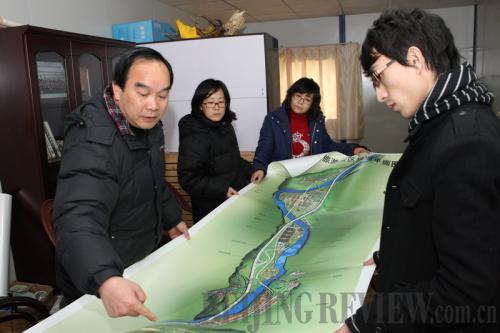|
 |
|
BLUEPRINT: Chen Renfu, head of the twinning program team from Zhuhai City, south China's Guangdong Province, discusses reconstruction plans for Mianchi Township in Wenchuan, Sichuan Province (ZHAO XI) |
Over half of the reconstruction projects in earthquake-devastated Mianchi Township, funded by Zhuhai City of Guangdong Province, have been completed. The town, with a large ethnic Qiang population, is on the way to becoming a tourist resort famous for ethnic culture.
In the wake of the 8.0-magnitude earthquake that struck Sichuan Province in May 2008, Mianchi, which is only 18 km from the epicenter in Wenchuan County, suffered enormous losses. In addition to the heavy loss of life, the earthquake destroyed about 80 percent of Mianchi homes. Zhuhai City, which was entrusted with the task of aiding Mianchi's reconstruction, had a lot of work to do.
According to Chen Renfu, head of Zhuhai's reconstruction aid team in Mianchi, the total budget for Zhuhai-aided projects is 340 million yuan ($50 million) and over half of the planned projects have been completed, worth a total of 270 million yuan ($39.7 million). As of mid-January, the team had completed 10 major infrastructure projects that address people's basic living needs.
"We have followed the post-earthquake reconstruction principles put forward by Chinese President Hu Jintao, which emphasized respect for local people's interests, protection of the natural environment and scientific planning," said Chen. "We also followed certain principles for our reconstruction campaign, which are to guarantee people's basic livelihood, protect cultural heritage and set up a long-term development plan."
When planning the reconstruction projects, Zhuhai's aid team prioritized the construction of basic facilities concerning people's daily life, such as schools, hospitals, social welfare institutions, entertainment facilities and, in rural areas, safe drinking water facilities, roads, farmland irrigation systems and new settlements for farmers.
Chen said that while drafting their reconstruction plans, team members focused on achieving equality in access to public services and gave up on building any landmarks. "Without a large budget, we don't intend to build any extravagant architecture," Chen said. "We just want to improve local residents' living standards through our reconstruction efforts."
Several projects completed by Zhuhai's aid team in Mianchi, including a school, a social welfare institution and a cultural center, have won provincial-level awards for excellent architecture.
Tapping local tourism resources
Another major goal for Zhuhai's aid team is to achieve Mianchi's sustainable development.
Of the total local population of 30,000, 60 percent are of Qiang ethnicity, 20 percent are Tibetans and the rest are Han and Hui people. The aid team found out through field inspections that the town is rich in Qiang and Tibetan ethnic cultural sites. After finishing basic people's livelihood facilities, the aid team mapped out a plan to develop local tourism resources.
"In our plan, several Qiang villages will become designated stops on an ethnic culture tour. We will also help develop major tourism destinations," said Chen. He said another advantage for Mianchi to attract tourists is that it is linked to high-quality roads and highways.
The tourism development plan, if approved by the local government, will require hundreds of millions in investment over the next few years. Zhuhai City will donate 100 million yuan (about $14.64 million) to support the project, while the rest will come from local government and the private sector. Chen said his team hopes that local residents will adjust their lifestyles to meet the needs of a boom in the local services sector, especially tourism.
(Reporting from Mianchi, Sichuan Province) |
